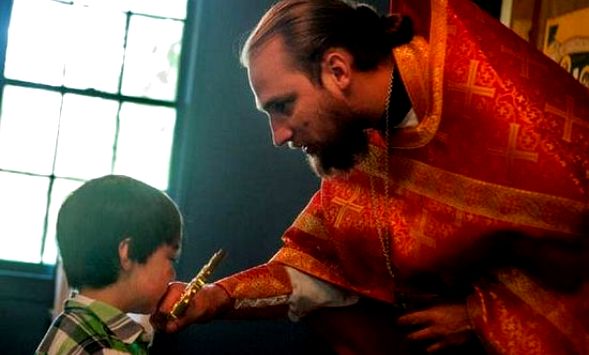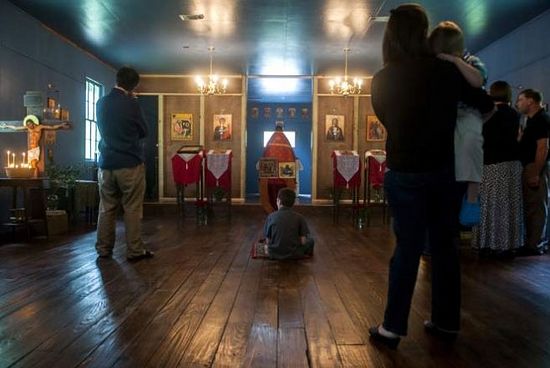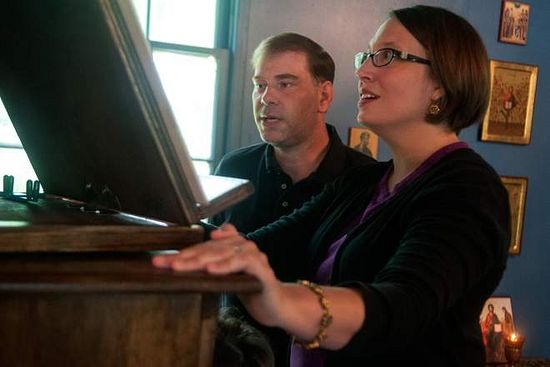By George Morris
 |
About nine years ago, Shannon Tilley, of St. Francisville, was becoming discontent with Southern Baptist churches. Praise choruses were replacing familiar hymns.
“That wasn’t me,” he said. “If this is the church, why would it change at all?”
Members of Tilley’s Bible study group began digging into church history. The search for authentic, old-time religion took them to a place they didn’t expect — Orthodoxy.
Now, remarkably, there is a Russian Orthodox mission in West Feliciana Parish.
Since January, St. John the Theologian Orthodox Mission has been holding Sunday liturgy and almost daily vespers for a small but dedicated group of congregants in a rented house in Starhill, its wood shop converted into a sanctuary.
None of them, including the Rev. Matthew Harrington, grew up Orthodox, but all have been drawn by disciplines and worship that date to Christianity’s origins.
“It’s the faith that was handed down by Christ to the apostles,” Tilley said. “It’s the same now as it was 600, 700, 1,000, 2,000 years ago. The service that we have on Sunday mornings is the same service they had in the fourth century, third century.”
For its first millennia, Christianity grew from a persecuted sect to the Roman state religion whose authority was based in Rome and Constantinople (now Istanbul, Turkey). Doctrinal disputes between the Greek east and Latin west led to the Great Schism of 1054.
Orthodoxy became the primary strain of Christianity along the eastern Mediterranean, Balkans and north into Russia. Catholicism spread west.
As immigrants brought their religions with them, Catholicism and Protestantism became the major religions of the United States, with Orthodoxy staying largely within its ethnic enclaves. But that is not the case with the St. John Mission.
 |
Jack Cutrer, like Tilley, began to look for a different Christian experience, visiting Methodist, Episcopal and Catholic churches before settling on Orthodoxy.
“If this is the oldest church in Christendom, then I guess the water is purest the closest to the fountain,” Cutrer said.
Tilley, Cutrer and a handful of others began attending Christ the Savior Orthodox Church in McComb, Miss. As a couple of other families joined them, the priest would come to St. Francisville once a month to provide liturgy. When that priest transferred to another church and his replacement would not come to them, they began attending services at St. Matthew the Apostle Orthodox Church in Baton Rouge.
Rod Dreher, who grew up in Starhill, and his wife, Julie, had converted to Orthodoxy while living in Dallas, and moved to St. Francisville in 2011. They contacted the Rev. Seraphim Bell, Russian Orthodox Church Outside of Russia missions director, and asked how to go about starting a mission church there.
Bell sent Harrington, 37, a bivocational priest in Walla Walla, Wash., to visit. The small congregation asked him to come permanently. He agreed.
“In the Northwest, I would walk around and I might get, ‘What are you supposed to be? Well, I’m spiritual and not religious, and I don’t need what you’re selling,’ even though I was just buying eggs and milk at the grocery store,” he said. “Down here, it’s, ‘Oh, you’re a priest, you’re a father. What’s your reading on this?’ The dialogue is so easy, because people are formed reading the Scriptures. ”
 |
Congregants stand during the Sunday morning liturgy in which psalms, the Gospels and other Bible passages are sung without instruments and prayers are offered. They sit to hear Harrington’s sermon. Incense, icons and Communion are part of each service.
A family was baptized into the congregation this spring, which, though pleasing to Harrington, is not how he measures success.
“The divine liturgy and the services are being served every day,” he said. “People are slowly finding the faith. It’s not a numbers game.
“The Orthodox view church as a hospital for a sick soul, where you receive medicine, where you receive healing. … This is one place where it’s OK not to be OK.”
Harrington said Orthodox leaders consider the South to be an area where this faith has the best chance in America of growing in the future. He smiled after saying that.
“Now, Orthodox measure future in millennia,” he said. “A century is pretty quick for Orthodox.”

I am glad the Orthodox Church is spreading throughout the United States. The litany and preaching should be in English since this is still, to date, America.
My experiences in the Orthodox Churches I have visited has been positive and I will continue to visit various churches from time to time. The coffee hour is important because it gives non-Orthodox visitors an opportunity to get to know there Orthodox neighbors.
Protestant Inquirer
Orthodoxy needs to spread to Deltona, Fl. None around here. There are a few in areas maybe 25 to 30 miles from here. I work retail, alot a sundays and nights. driving 30 miles is just not possible most of the time, I was raised baptist. converted to catholiism 20 years ago give or take. I’ve read a few things by st tikon of Zadonsk. love the Jesus prayer. Mark the hermit. one day, Hopefully soon I will make it to a Orthodox Divine Liturgy.
Dear Pauline,
I hope your visits to Orthodox parishes continue to go well. I visited three before settling in one. The use of languages other than English is sometimes done in consideration to the grandparents and great-grandparents who emigrated from other countries. It is also done in consideration to the ethnic mixture of the parish. My parish celebrates services in English 99% of the time, although now having been chrismated for a few years I find it awesome to be able to pray the Our Father in Greek as well as some other liturgical phrases in Greek. My fondest memory is of a parish in Edinburgh, Scotland, that celebrated pieces of the Divine Liturgy in four languages. It was long and beautiful. I pray your journey is fruitful.
David, we should talk!